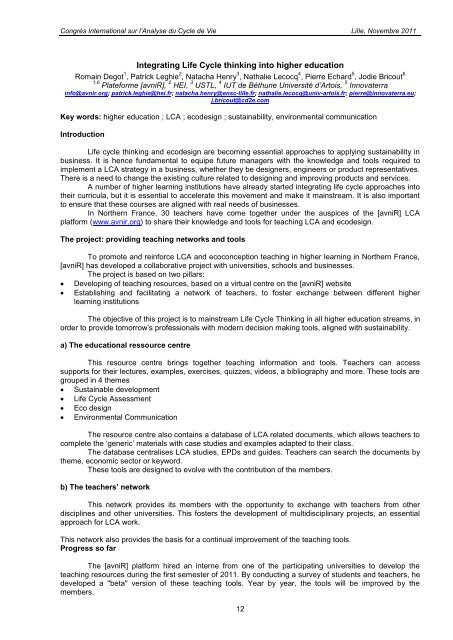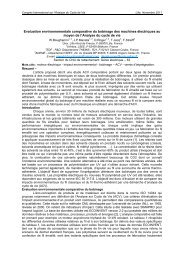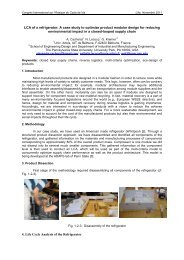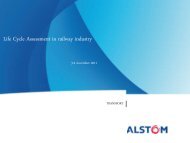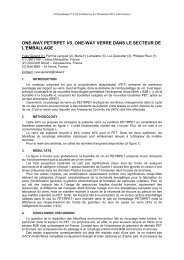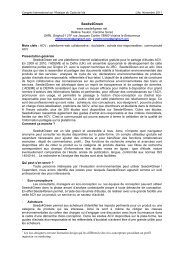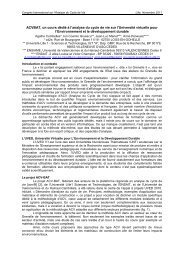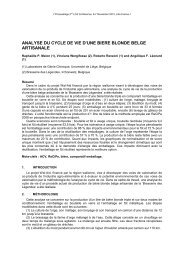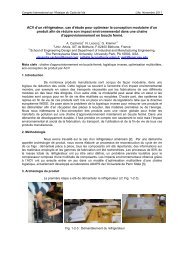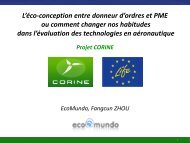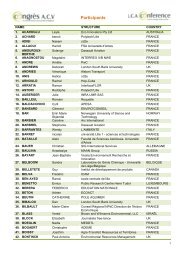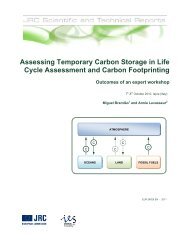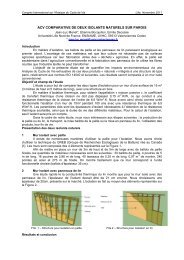Untitled - avniR
Untitled - avniR
Untitled - avniR
You also want an ePaper? Increase the reach of your titles
YUMPU automatically turns print PDFs into web optimized ePapers that Google loves.
Congrès International sur l’Analyse du Cycle de Vie Lille, Novembre 2011<br />
Integrating Life Cycle thinking into higher education<br />
Romain Degot 1 , Patrick Leghie 2 , Natacha Henry 3 , Nathalie Lecocq 4 , Pierre Echard 5 , Jodie Bricout 6<br />
1,6 Plateforme [<strong>avniR</strong>], 2 HEI, 3 USTL, 4 IUT de Béthune Université d’Artois, 5 Innovaterra<br />
info@avnir.org; patrick.leghie@hei.fr; natacha.henry@ensc-lille.fr; nathalie.lecocq@univ-artois.fr; pierre@innovaterra.eu;<br />
j.bricout@cd2e.com<br />
Key words: higher education ; LCA ; ecodesign ; sustainability, environmental communication<br />
Introduction<br />
Life cycle thinking and ecodesign are becoming essential approaches to applying sustainability in<br />
business. It is hence fundamental to equipe future managers with the knowledge and tools required to<br />
implement a LCA strategy in a business, whether they be designers, engineers or product representatives.<br />
There is a need to change the existing culture related to designing and improving products and services.<br />
A number of higher learning institutions have already started integrating life cycle approaches into<br />
their curricula, but it is essential to accelerate this movement and make it mainstream. It is also important<br />
to ensure that these courses are aligned with real needs of businesses.<br />
In Northern France, 30 teachers have come together under the auspices of the [<strong>avniR</strong>] LCA<br />
platform (www.avnir.org) to share their knowledge and tools for teaching LCA and ecodesign.<br />
The project: providing teaching networks and tools<br />
To promote and reinforce LCA and ecoconception teaching in higher learning in Northern France,<br />
[<strong>avniR</strong>] has developed a collaborative project with universities, schools and businesses.<br />
The project is based on two pillars:<br />
<br />
<br />
Developing of teaching resources, based on a virtual centre on the [<strong>avniR</strong>] website<br />
Establishing and facilitating a network of teachers, to foster exchange between different higher<br />
learning institutions<br />
The objective of this project is to mainstream Life Cycle Thinking in all higher education streams, in<br />
order to provide tomorrow’s professionals with modern decision making tools, aligned with sustainability.<br />
a) The educational ressource centre<br />
This resource centre brings together teaching information and tools. Teachers can access<br />
supports for their lectures, examples, exercises, quizzes, videos, a bibliography and more. These tools are<br />
grouped in 4 themes<br />
Sustainable development<br />
Life Cycle Assessment<br />
Eco design<br />
Environmental Communication<br />
The resource centre also contains a database of LCA related documents, which allows teachers to<br />
complete the ‘generic’ materials with case studies and examples adapted to their class.<br />
The database centralises LCA studies, EPDs and guides. Teachers can search the documents by<br />
theme, economic sector or keyword.<br />
These tools are designed to evolve with the contribution of the members.<br />
b) The teachers’ network<br />
This network provides its members with the opportunity to exchange with teachers from other<br />
disciplines and other universities. This fosters the development of multidisciplinary projects, an essential<br />
approach for LCA work.<br />
This network also provides the basis for a continual improvement of the teaching tools.<br />
Progress so far<br />
The [<strong>avniR</strong>] platform hired an interne from one of the participating universities to develop the<br />
teaching resources during the first semester of 2011. By conducting a survey of students and teachers, he<br />
developed a "beta" version of these teaching tools. Year by year, the tools will be improved by the<br />
members.<br />
12


